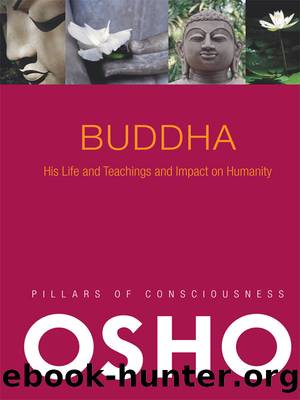Discover the Buddha: 53 Meditations to Meet the Buddha Within by Osho

Author:Osho
Language: eng
Format: mobi
Tags: Buddhism
ISBN: 9780981834146
Publisher: Osho Media
Published: 2009-12-15T00:18:28+00:00
big boat, little boat
BEFORE ENLIGHTENMENT the master prepares the people who are going to succeed him, makes them more articulate, makes them better able to transform the wordless into words, the absolutely silent into song, the absolutely unmoving into dance. Only then will he be able to convey something of help to blind humanity.
Buddha divided his enlightened people into two categories. They both have the same heightâthere is no quality of lower or higherâthey both belong to the same cosmic reality, the fundamental nature. One category is called the arhatasâthe arhatas are the ones who become enlightened and remain silentâand the second category is called bodhisattvas. They also become enlightened, but their work is to convey something, some device, some hint about their experience to people.
Arhatas are also called hinayana, a little boat in which one man can row and go to the other side. Of course he reaches the other shore. And bodhisattvas are the mahayana, a great ship in which thousands of people can move to the other shore. The other shore is the same, but the bodhisattva helps many.
The arhata is not articulate; he is a simple, nice, utterly humble person, but will not utter a single word of what he has attained. It is too much for him to say anything. He is completely contented; why should he speak? And anyway, everybody has to find his own way, so why unnecessarily harass people? The arhata has his own standpoint.
The arhata is someone who makes every effort to become enlightened and once he is enlightened he completely forgets about those who are still groping in the dark. He has no concern with others. It is enough for him to become enlightened. In fact, according to the arhatas, even the great idea of compassion is nothing but another kind of attachment.
Compassion is also a relationship; howsoever beautiful and great, it is also a concern with others. It is also a desire. Although it is a good desire, it makes no differenceâaccording to the arhatas, desire is a bondage whether it is good or bad. The chains can be made of gold or of steel, it doesn't matter; chains are chains. Compassion is a golden chain.
The arhata insists that nobody can help anybody else at all. The very idea of helping others is based on wrong foundations. You can help only yourself.
It may occur to the ordinary mind that the arhata is very selfish. But if you look without any prejudice, perhaps he also has something immensely important to declare to the world. Even helping the other is an interference in his life, in his lifestyle, in his destiny, in his future. Hence, arhatas don't believe in compassion. Compassion to them is another beautiful desire to keep you tethered to the world of attachments. It is another nameâbeautiful, but it is still just a nameâfor a desiring mind.
Why should you be interested in somebody becoming enlightened? It is none of your business. Everybody has absolute freedom to be himself. The arhata insists on individuality and its absolute freedom.
Download
This site does not store any files on its server. We only index and link to content provided by other sites. Please contact the content providers to delete copyright contents if any and email us, we'll remove relevant links or contents immediately.
The Way of Zen by Alan W. Watts(6562)
Ego Is the Enemy by Ryan Holiday(5356)
The Art of Happiness by The Dalai Lama(4102)
The Book of Joy by Dalai Lama(3948)
Why Buddhism is True by Robert Wright(3428)
Spark Joy by Marie Kondo(3277)
Shift into Freedom by Loch Kelly(3171)
Happiness by Matthieu Ricard(3026)
A Monk's Guide to a Clean House and Mind by Shoukei Matsumoto(2894)
The Lost Art of Good Conversation by Sakyong Mipham(2631)
The Meaning of the Library by unknow(2539)
The Unfettered Mind: Writings from a Zen Master to a Master Swordsman by Takuan Soho(2276)
The Third Eye by T. Lobsang Rampa(2245)
Anthology by T J(2186)
Red Shambhala by Andrei Znamenski(2168)
The Diamond Cutter by Geshe Michael Roach(2043)
Thoughts Without A Thinker: Psychotherapy from a Buddhist Perspective by Epstein Mark(1994)
Twilight of Idols and Anti-Christ by Friedrich Nietzsche(1875)
Advice Not Given by Mark Epstein(1864)
